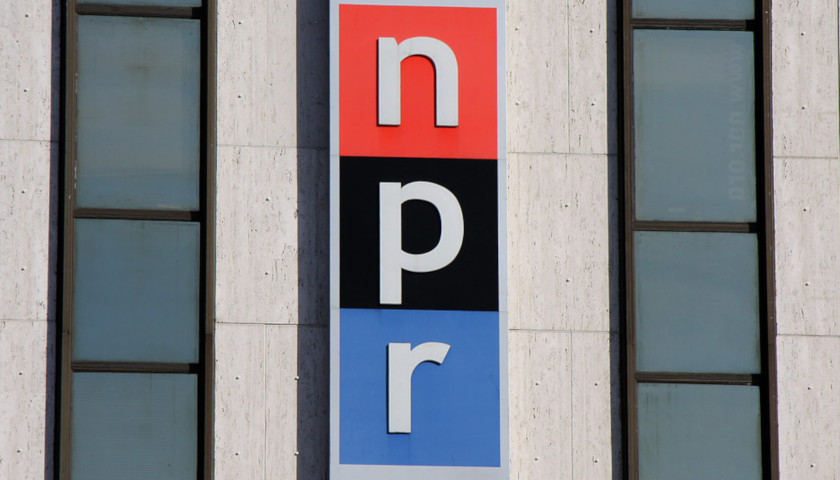As states such as Georgia and Alabama recently passed Fetal Heartbeat Bills, National Public Radio (NPR) issued a “Guidance Reminder: On Abortion Procedures, Terminology & Rights,” which specifically states, do not use ‘pro-life’ in copy except when used in the name of a group.
The Guidance Reminder was issued by NPR’s Mark Memmott, the organization’s Standards & Practices Editor on May 15, which first thanked all those involved for following long-standing guidance very well during the recent coverage of the new “abortion law” in Georgia and legislation in Alabama.
On the surface, NPR has strict guidance in the impartiality section of its Ethics Handbook, which applies to NPR employees both inside and outside of the newsroom.
NPR employees are restricted from publicly expressing political opinions which includes not putting bumper stickers on cars, putting political signs in their yards, signing political petitions, donating money to candidates, endorsing candidates, advocating, running for office, endorsing candidates other otherwise engaging in politics in a participatory or activist manner.
The expectation of impartiality is also extended to NPR employees on social media.
The handbook section titled “Impartiality in our journalism,” is further explained in the Ethics Handbook: “fair, accurate and impartial reporting being the foundation of NPR news coverage.
The section goes on to state, “The perception of bias is intensively subjective, hanging on the tiniest nuances – a gesture, a word, a slight intonation.”
And yet, while recognizing their “lofty standard,” NPR’s Standards & Practices Editor Memmott reminds NPR member stations of the style guide in a manner that appears to be anything but impartial.
In introducing the “long-standing guidance” without a reference to how long it has been in place, Memmott states in reference to the George and Alabama Heartbeat Bills, “One thing to keep in mind about this law and others like it: Proponents refer to it as a ‘fetal heartbeat’ law. That is their term.” (emphasis added)
“It needs to be attributed to them if used and put in quotation marks if printed.” (emphasis added)
The use of the words “proponents,” “their,” and “them,” implies a clear separation in the belief system of Memmott’s audience of NPR employees and member stations and that of pro-life advocates.
This while NPR touts on its website, “of the major U.S. news brands, research shows that NPR ranks #1 in being ‘credible’ and ‘honest,’ rising above the major television and cable news networks and media outlets including The New York Times, MSNBC, and Fox News in both categories.”
NPR gets a significant level of funding in the form of federal tax dollars through the Corporation for Public Broadcasting (CPB). CPB was created subsequent to the Public Broadcasting Act of 1967 and is required by law to distribute 95 percent of its $445.5 million in federal appropriations as grants to local television and radio stations as well as programming and improvements to the public broadcasting system. More than 20 percent of that funding is reportedly allocated from CPB for radio stations and programming.
NPR reports that its member stations get 8 percent of their revenues from federal appropriations via CPB and another 4 percent from federal, state and local governments.
Member stations then turn around and pay station dues and fees to NPR, which is the organization’s largest revenue stream.
CPB’s role in public media is to shield stations from political influence, and deliver federal support in a way that does not affect a station’s ability to operate independently, according to the organization’s website.
Apparently, abortion is a topic NPR is challenged in addressing head-on.
Rather than calling it what it is – abortion, according to the style guide, “NPR doesn’t use the term ‘abortion clinics.’ We say instead, “medical or health clinics that perform abortions.’ The point is to not to use abortion before the word clinic.”
NPR justifies this specific guidance by adding, “The clinics perform other procedures and not just abortions.”
With regard to the actual human life developing in the womb, NPR guides, “The term ‘unborn’ implies that there is a baby inside a pregnant woman, not a fetus. Babies are not babies until they are born. They’re fetuses. Incorrectly calling a fetus a ‘baby’ or ‘the unborn’ is part of the strategy used by antiabortion groups to shift language/legality/public opinion.”
While NPR prefers the use of the word “fetus,” perhaps because of its seeming more impersonal nature, in Latin, “fetus” actually means the more endearing term “little one,” referring to the relatively small size of the preborn baby, says Why Pro-Life.
Very specific “do not” directions from NPR on the topic include “do not use the term ‘pro-abortion rights,” or “pro-life” and “pro-choice” except when used in the name of a group or otherwise used in actuality.
According to NPR, it is, however, acceptable to use the phrase “abortion rights supporter(s)/advocate(s)” and derivatives thereof. Also acceptable to NPR is “anti-abortion rights,” although another unacceptable term is “pro-abortion rights.”
NPR even has a problem with the wording “late term” when referring to abortion, saying that it “gives the impression that the abortion takes place in the 8th or 9th month.”
NPR wants the procedure referred to as “intact dilation and extraction” and states with a level of authority that is unclear and uncited, “the procedure is performed most often in the 5th or 6th month — the second trimester — and the second trimester is not considered ‘late’ pregnancy.”
Apparently, the use of the term “second trimester” creates an issue for NPR as well, instructing, “As an alternative, call it a certain procedure performed after the first trimester of pregnancy and, subsequently, the procedure….”
The full text of NPR’s Guidance Reminder: On Abortion Procedures, Terminology & Rights can be read here:
Guidance Reminder: On Abortion Procedures, Terminology & Rights
Dated May 15, 2019 (Mark Memmott, Standards & Practices Editor)
As we’ve covered the new abortion law in Georgia and legislation in Alabama, we’ve followed long-standing guidance very well. Thank you to all involved.
For those new to the subject, that guidance about abortion and related topics is collected in our Intranet “radio” style guide. We’ll attach it below.
One thing to keep in mind about this law and others like it: Proponents refer to it as a “fetal heartbeat” law. That is their term. It needs to be attributed to them if used and put in quotation marks if printed. We should not simply say the laws are about when a “fetal heartbeat” is detected. As we’ve reported, heartbeat activity can be detected “about six weeks into a pregnancy.” That’s at least a few weeks before an embryo is a fetus.
Here is the long-standing guidance:
ABORTION PROCEDURES & TERMINOLOGY: Use the term intact dilation and extraction to describe the procedure, or a procedure known medically as intact dilation and extraction; opponents call it partial-birth abortion. On the latter, it is necessary to point out that the term partial-birth is used by those opposed to the procedure; simply using the phrase so-called partial birth abortion is not sufficient without explaining who’s calling it that. Partial-birth is not a medical term and has no exact parallel in medical terminology; intact dilation and extraction is the closest description. Also, it is not correct to call these procedures RARE — it is not known how often they are performed. Nor is it accurate to use the phrase LATE TERM ABORTION. Though we initially believed this term carried less ideological baggage when compared with partial-birth, it still conveys the sense that the fetus is viable when the abortion is performed. It gives the impression that the abortion takes place in the 8th or 9th month. In fact, the procedure called intact dilation and extraction is performed most often in the 5th or 6th month — the second trimester — and the second trimester is not considered “late” pregnancy. Thus “late term” is not appropriate. As an alternative, call it a certain procedure performed after the first trimester of pregnancy and, subsequently, the procedure…. Also note:
NPR doesn’t use the term “abortion clinics.” We say instead, “medical or health clinics that perform abortions.” The point is to not to use abortion before the word clinic. The clinics perform other procedures and not just abortions.
Do not refer to murdered Dr George Tiller as an “Abortion Doctor.” Instead we should say Tiller operated a clinic where abortions are performed. We can also make reference to the fact that Tiller was a doctor who performed late abortions.
Here’s some additional guidance from Joe Neel, regarding the Unborn Victims of Violence Act:
The term “unborn” implies that there is a baby inside a pregnant woman, not a fetus. Babies are not babies until they are born. They’re fetuses. Incorrectly calling a fetus a “baby” or “the unborn” is part of the strategy used by antiabortion groups to shift language/legality/public opinion. Use “unborn” only when referring to the title of the bill (and after President Bush signs it, the Unborn Victims of Violence Law). Or qualify the use of “unborn” by saying “what anti-abortion groups call the ‘unborn’ victims of violence.” The most neutral language to refer to the death of a fetus during a crime is “fetal homicide.”
ABORTION RIGHTS:
On the air, we should use “abortion rights supporter(s)/advocate(s)” and “abortion rights opponent(s)” or derivations thereof (for example: “advocates of abortion rights”). It is acceptable to use the phrase “anti-abortion rights,” but do not use the term “pro-abortion rights”. Digital News will continue to use the AP style book for online content, which mirrors the revised NPR policy. Do not use “pro-life” and “pro-choice” in copy except when used in the name of a group. Of course, when the terms are used in an actuality they should remain.
—
Laura Baigert is a senior reporter at The Tennessee Star.





